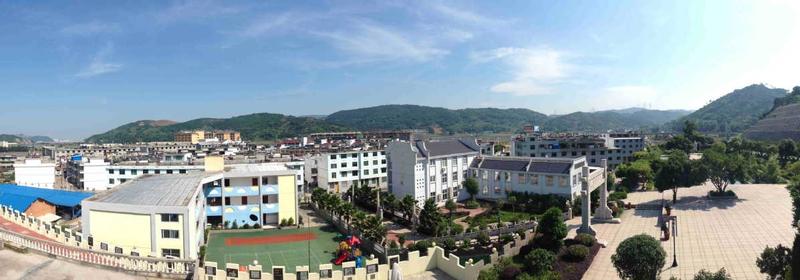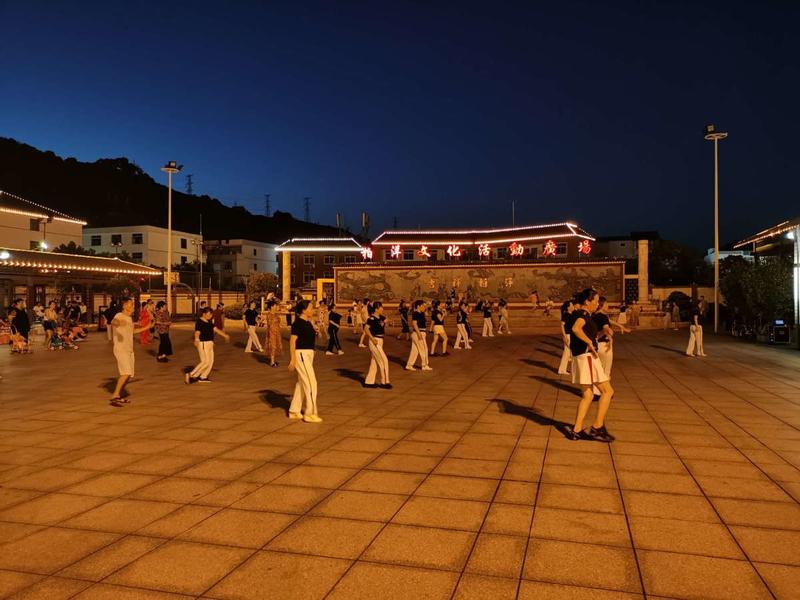 This undated photo shows a panoramic view of Boyang village in Fuding, Fujian province. The once poverty-stricken village was relocated 20 years ago and now has its own kindergarten, primary school, park and a cultural square with a pond and fountain. (PHOTO PROVIDED TO CHINA DAILY)
This undated photo shows a panoramic view of Boyang village in Fuding, Fujian province. The once poverty-stricken village was relocated 20 years ago and now has its own kindergarten, primary school, park and a cultural square with a pond and fountain. (PHOTO PROVIDED TO CHINA DAILY)
At 6:30 pm every day, Zeng Yanhong joins about 60 other women in Boyang village's public square to dance the night away.
Their repertoire covers a range of dance styles, from folk to shuffle and even ballroom.
"Thanks to our village's development in recent years, almost every household owns a house and a car," Zeng, 46, said. "And every villager can earn several thousand yuan a month without leaving home, so we have the time and energy for such recreational exercise to keep ourselves happy and healthy."
Boyang, a village in Fuding, Fujian province, used to be poverty-stricken and only accessible by foot.
In recent years, many villagers, who were farmers before, have become self-employed business people, private business owners or even enterprise shareholders.
Wang Zhouqi, Party head of Boyang village, Fujian province, China
When Zeng moved to Boyang with her husband more than 20 years ago, most villagers lived in shabby wooden houses in the mountains and the villagers' per capita income was less than 600 yuan a year.
ALSO READ: 'The most remarkable achievement of our times'
Under the leadership of Wang Zhouqi, who gave up his own business and returned home to serve as Boyang's Party head in 1994, villagers started to grow waxberries and breed mudskippers to boost their incomes.
In 2000, the whole village was relocated down from the mountains thanks to a resettlement program, and all its households, including Zeng's family, moved into three-or four-story buildings.
As the village was gradually connected to the outside by newly built expressways and railway lines, Boyang opened up land in 2002 for use as an industrial park to bring in investment and enterprises.
The Boyang industrial park, now covering an area of 33.3 hectares, has attracted eight enterprises with a total annual output value of 2.2 billion yuan (US$316.5 million) and provides employment for more than 1,300 villagers.
Wang said the next step for the village will be to develop tertiary industry by opening hotels and supermarkets to provide services for people working for the industrial park and a nearby nuclear power station.
 This undated photo shows residents of Boyang village in Fuding, Fujian province, dancing at night. (PHOTO /
CHINA DAILY)
This undated photo shows residents of Boyang village in Fuding, Fujian province, dancing at night. (PHOTO /
CHINA DAILY)
"In recent years, many villagers, who were farmers before, have become self-employed business people, private business owners or even enterprise shareholders," Wang said, noting that some villagers can earn more than 30,000 yuan a month by renting their houses and running noodle stalls.
Last year, the per capita disposable income of Boyang villagers was 28,976 yuan.
Seven years ago, to provide more public services for villagers, Boyang started to build a park, kindergarten, primary school and a cultural square with a pond and a fountain.
READ MORE: With the whole nation mobilized, we are set to win war against poverty
The cultural square, where the villagers now gather to dance each night, was put into use in 2015.
Zeng, who is also a member of the village committee responsible for women's work, said the dancing was started to enrich villagers' lives after their day's work.
The village gave the dance group more than 20,000 yuan to purchase audio equipment and dance wear.
Zeng and some of the other villagers later found that the regular dancing greatly eased the symptoms of common ailments such as diabetes and hypertension.
Kong Shiqin, who arrived in Boyang more than 10 years ago after marrying a local, is an enthusiastic member of the dance group.
She joined the group after watching its members dance several times and is now one of the villagers who leads the nightly dances.
After a day's work at a factory in the industrial park, Kong said she enjoyed the time she spent dancing with "a group of sisters".
"I love dancing and being together with them," she said. "Whenever I come to dance, I feel a sense of great relief and relaxation."
Contact the writers at mojingxi@chinadaily.com.cn


